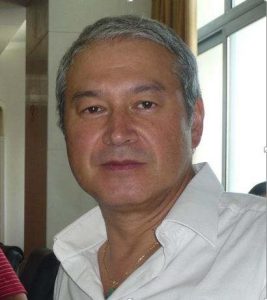As a true visionary, Jean-Marc Sabatier* highlights the essential role of the Renin-Angiotensin System in the occurrence of numerous pathologies. Too little known until now, “this hormonal system is everywhere and it controls everything” he says. Interview.

What is the renin-angiotensin system (RAS), whose dysfunction you claim is the cause of many diseases?
It is the most important physiological regulatory system in our body; it controls autonomic, renal, pulmonary and cardiovascular functions. It also controls innate immunity and the various microbiota (including the intestinal microbiota). It is a cascade of endocrine and enzymatic regulation. This ubiquitous system is found in all organs and tissues of the human body.
You were the first to demonstrate that the dysfunctional RAS was at the origin of Covid-19 diseases. What is new today?
Indeed, I see that all pathologies in the human body result from the dysfunction of this key system of the organism, when these pathologies are not associated with genetic anomalies. This goes far beyond Covid-19. In order to understand it, one must take into account the genetic polymorphism of the actors (ligands and receptors) of the RAS, its evolution during the life of a person (the RAS of the baby is different from that of the child, the adult and the elderly), it evolves from birth to death. Because of its omnipresence in the body at the level of organs, tissues and cells, it controls all the functions related to cellular life. It is this global “vision” of the importance of the RAS in the total control of the human body, as well as in the potential triggering of various pathologies, that is new. Researchers will certainly discover little by little the extreme importance of the RAS, this hormonal system misnamed because it was initially identified in the kidney and in the liver (hence its name) whereas it is finally present in all the organs. It controls all the vital functions of the body.
The binding of the coronavirus SARS-CoV-2 (or spike protein) to its cellular receptor ACE2 (angiotensin converting enzyme 2) hinders the degradation of angiotensin 2 by ACE2 which, in excess, induces the over-activation of the cellular receptor AT1R. The over-activation of the RAS has very deleterious effects on the organism, leading in particular to the development of COVID-19 diseases. The AT1R receptor has vasoconstrictor (hypertensive), pro-inflammatory (cytokine storm), pro-thrombotic, pro-fibrosing, pro-oxidative (causes oxidative stress), pro-angiogenic, hypertrophying organs (heart, lungs, etc.), inhibiting the production of nitric oxide (NO) affecting the immune and nervous systems… The over-activated AT1R receptor (= RAS dysfunction) is thus the real culprit in Covid-19 diseases.
This is a visionary approach to science…
Yes, I am anticipating what I think will only become obvious to researchers in several decades of extensive research: the onset of autoimmune diseases and cancers due to RAS dysregulation (except for genetic diseases). All these diseases have one thing in common: the ubiquitous RAS. It is the key to all non-genetic pathologies, the conductor of the functions of the human body and not the brain as is still believed today. Because the brain is itself controlled by the RAS. It controls the functions of the neurons and other cells of the nervous system. It is the supreme leader within our organism. This central role of the RAS is still unknown today. It will probably come to light late, in the next few decades, given the complexity of this hormonal system and the relatively slow progress of science in this field of research.
How do you come to this conclusion?
This hormonal system is ubiquitous. That is to say, it is omnipresent in the various tissues and organs of the human body, including within our cells where it has an intracrine activity. For example, in cells, RAS is found on the inner membrane of mitochondria, on the nuclear membrane and on other membranes of intracellular organelles, thus there is no known equivalent in other physiological systems. Why is the RAS so ubiquitous in the body? Because it controls everything. It needs to be everywhere.
It should be noted that there are also variants of the RAS that correspond to an adaptation of this system to the specific function of the organ. For example, the RAS in the heart is not the same as the RAS in the lungs. There is also a specific RAS in the brain, intestines, etc. The same receptors and ligands are always involved, but their proportion and tissue distribution are not identical. Thus, the local RAS is adapted to the function of the organ. We are thus putting our finger on the major system that controls the whole human body. And finally, nobody has yet identified it as such!
Does taking into account the dysfunction of the RAS make it possible to better treat the pathologies it causes?
If we solve the problems linked to RAS dysfunction, it is theoretically possible to treat the various (non-genetic) pathologies observed in humans: nervous pathologies (Alzheimer’s, Parkinson’s, etc.), autoimmune diseases (multiple sclerosis, rheumatoid arthritis, etc.), cancers (the RAS controls cell proliferation), etc. Its involvement in the functioning of the human body goes, in my opinion, far beyond what is currently described. Its omnipresence in intracellular organelles, including mitochondria, shows that it represents the key to the functioning of cells, which makes me say today that it is probably at the origin of all non-genetic pathologies. The RAS also plays a role in the longevity of individuals. In particular, it acts on DNA repair and the integrity of telomeres (structures located at the end of chromosomes, involved in longevity).
How can it be targeted?
Currently, medicine treats mainly the consequences, but not the causes of diseases. In order to cure the various human pathologies (and mammalian pathologies in general), whatever their nature, it would be necessary in my opinion to target the renin-angiotensin system. This should make it possible to modulate the potentially deleterious actions of an overactivated RAS on the organism.
I would like to emphasize the importance of this research avenue, which is still largely unknown, because I am firmly convinced that in the coming decades, researchers will identify the crucial role of the RAS in the functioning of the body and the associated pathologies. I strongly encourage researchers and physicians to take an interest in this area of unsuspected potential, particularly in therapeutics. This should certainly lead to major advances in applied medicine, for the benefit of patients.
*Jean-Marc Sabatier is Director of Research at the CNRS and holds a PhD in Cell Biology and Microbiology and an HDR in Biochemistry. Editor-in-Chief of the international scientific journals: “Coronaviruses” and “Infectious Disorders – Drug Targets”. He is speaking in his own name.
Interview Space Twitter (4-5-2023) de Mäya (@MT7_sens) et Véronique (@VroniqueLvy2)#covid #Covid-19 #vaccination #vaccin #vaccines #vaccineinjuries #VaccineSideEffects #sars-cov-2 #sras #sars2 #vitamineDhttps://t.co/YEmgGwkGSH
— Sabatier Jean-Marc (@SabatierJeanMa1) May 5, 2023


